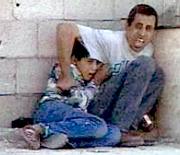Index relies entirely on the support of donors and readers to do its work.
Help us keep amplifying censored voices today.
A lieutenant colonel in the French army has been caught on camera menacing a Togolese journalist after the man took photographs of him admonishing youths. Romuald Letondo also threatened to smash Didier Ledoux’s camera.
Unfortunately for Letondot, the whole incident, including the rather pompous question “Do you know who I am?” was caught on video and has been posted on YouTube. The officer’s actions, unacceptable even back when Togo was a French colony, have drawn widespread condemnation from both the African media and French officials. Letondot was forced to apologise directly to Ledoux.
Letondot claims that he had been worried that the photos would be misinterpreted. Luckily the video clears up the affair. Fun starts at 50 seconds.
 It was the most iconic image of the second intifada: the killing of a Palestinian child. Ten years on, French libel courts are still settling disputes about what really happened at the Netzarim crossroads. Natasha Lehrer reports
It was the most iconic image of the second intifada: the killing of a Palestinian child. Ten years on, French libel courts are still settling disputes about what really happened at the Netzarim crossroads. Natasha Lehrer reports
Just over two years ago the French appeals court overturned a guilty verdict against Philippe Karsenty. The blogger was originally found guilty of libelling Charles Enderlin, the veteran French television correspondent whose report on the killing in September 2000 of 12-year-old Mohammed al Dura by an Israeli bullet has been the subject of controversy for a decade. Now Karsenty has won his own libel case against the broadcaster Canal + and the magazine L’Express.
In June this year, Canal + and TAC PRESSE, an independent television company, were found guilty of libelling Karsenty in a 2008 programme on the subject of media hoaxes. The programme drew parallels between the September 11 conspiracy theorists and Karsenty, who has spent almost 10 years challenging the veracity of Enderlin’s 2000 report for the state television station France 2. The court found that the failure of Stéphane Malterre, the documentary’s director, to make any mention whatsoever of the many doubts that have been raised about the original news report and which have been widely reported around the world — considerably more so than in France itself — constituted evidence of a lack of good faith on the part of the programme makers and the broadcaster Canal +, and justified Karsenty’s claim of libel.
An article by the journalist Vincent Hugueux, in the magazine L’Express, published the same day that Malterre’s documentary was broadcast, reiterated the accusation that Karsenty was a hoaxer.
In Rumeurs, intox: les nouvelles guerres de l’info….Stephane Malterre showed us various recent hoaxes, from the rantings after the September 11th attacks to the concerted attacks on the journalist Charles Enderlin.
…. The episode on the journalist Charles Enderlin, target of a campaign as loathesome and relentless as it is inept, had the merit of exposing two specimens in thrall to a pathetic form of nervous obsession: the historian Richard Landes and the Frenchman Philippe Karsenty.
On 1 July 2010, the presiding judge found in favour of Karsenty, L’Express was found guilty of libel. However, the judge rejected Karsenty’s claim for €25,000 damages, finding that Hugueux was influenced by the content of Malterre’s documentary and therefore had written his article in good faith.
In an interesting footnote to this long-running case, the judgment includes the following statement: “Philippe Karsenty acted in good faith by exercising his right to criticise Charles Enderlin for having broadcast a faked report.” Karsenty has made clear his satisfaction in this interestingly unequivocal statement, avowing in his own press release that the judgement will “be useful in the future because it confirms that France 2’s news report was phony and that [the] Canal + documentary was defamatory and manipulative enough to influence a journalist”. It seems highly unlikely that the judgment signals the end of this affair.
Natasha Lehrer is a writer and translator. She lives in Paris.
A Paris court has fined the France 24 news channel for repeating rumours that first lady Carla Bruni was having an affair with a French pop singer. Judges ordered the publicly-funded channel to pay 3,000 euros to the singer in question, Benjamin Biolay, following a ruling that the coverage violated his privacy. On April 6, it was reported that President Sarkozy has ordered a “campaign of terror” to punish those responsible for rumours which circulated last month on supposed extra-marital affairs by the French first couple reported in Britain and Switzerland. Lawyers for France 24 argued that it that exceptional level of international coverage made it a legitimate story to include in their press review. The court rejected this defence.
On the eve of this month’s presidential elections, the Togolese government refused to grant accreditation to French media outlets. Reporters without Borders criticised President Faure Essozimna Gnassingbe after correspondents from Radio France, RTL and La Croix were refused access to the country in the build up to the disputed 4 March vote. Diplomatic relations between the France and Togo have been tense, Togo gained its independence from the European country in 1960.